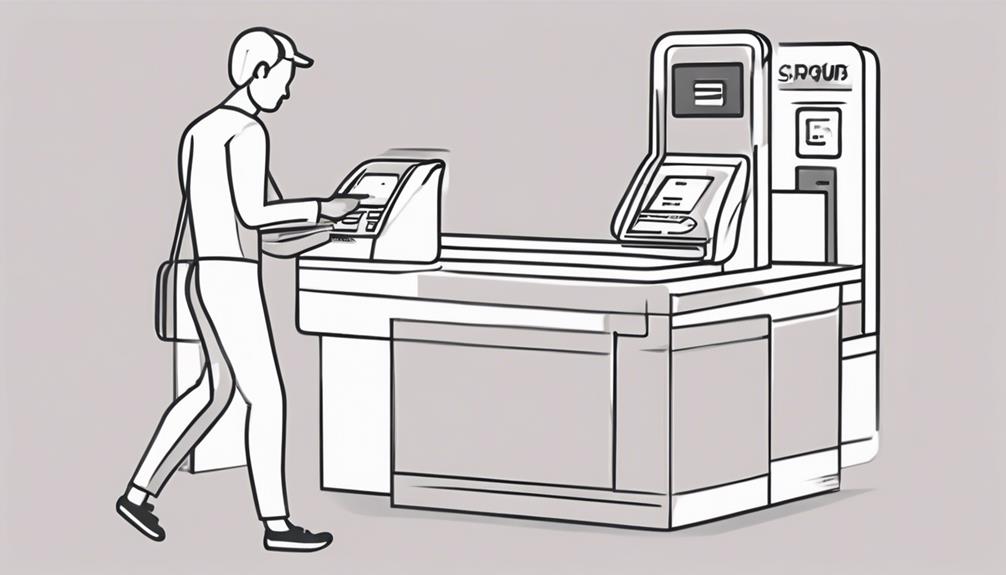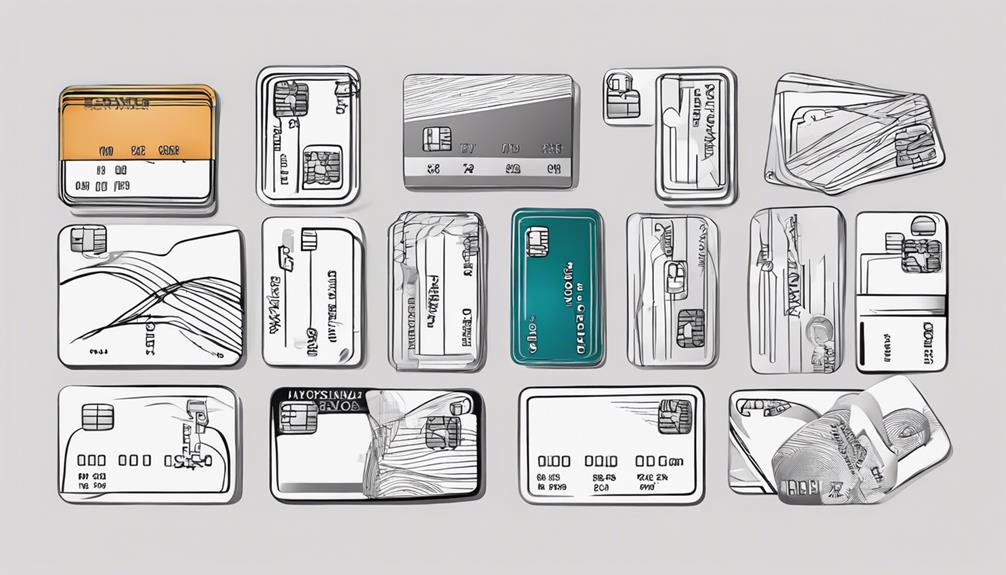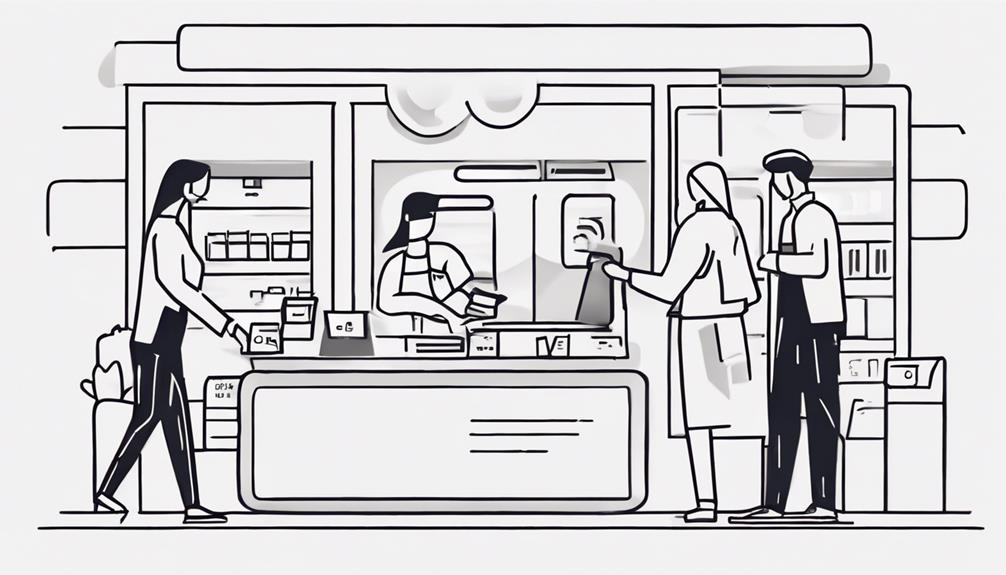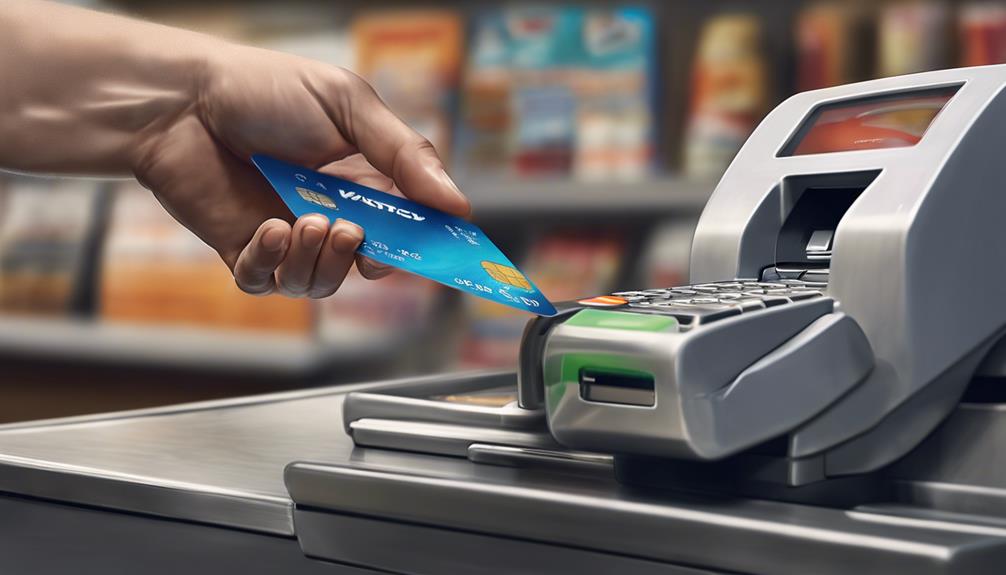Credit cards operate as intricate financial tools that facilitate transactions by extending users a credit line. Understanding the mechanics behind credit cards involves delving into concepts like interest rates, payment schedules, and credit limits. By comprehending these components, individuals can make informed decisions about their financial well-being. However, the complexities of credit cards don't end there – they also play a pivotal role in shaping credit histories and influencing future borrowing opportunities. This discussion will shed light on the inner workings of credit cards, offering insights into their multifaceted nature and implications on personal finance.
Key Takeaways
- Credit cards allow purchases up to a set limit with interest charges on unpaid balances.
- Responsible card use builds good credit history for future financial opportunities.
- Efficient credit card operations involve key players like issuers, networks, and banks.
- Managing credit limits by monitoring utilization and making timely payments is crucial for financial stability.
Understanding Credit Cards

What fundamental principles govern the functioning of credit cards that users must comprehend to make informed financial decisions? Credit cards operate on the premise of allowing users to make purchases on credit up to a predetermined spending limit. When using a credit card, users accumulate a balance based on their spending, which must be paid off in full each month to avoid accruing interest charges. Failing to pay the full balance results in the application of interest on the remaining amount, leading to increased overall costs. While providers set minimum payment requirements to maintain account standing, it is advisable to pay off the full balance whenever possible to avoid interest fees and debt accumulation. By using credit cards responsibly, individuals can build good credit history, which is crucial for accessing loans and financial opportunities in the future. Understanding the dynamics of credit card usage, including managing balances, making timely payments, and monitoring interest rates, is essential for maintaining financial health and stability.
Credit Card Operations
Credit card operations encompass critical aspects such as card payment processing and credit limit management. These components are essential for ensuring the smooth functioning of transactions and maintaining financial security. Understanding the intricate details of credit card operations is vital for both users and financial institutions to facilitate efficient payment processing.
Card Payment Processing
In the realm of financial transactions, the seamless operation of card payment processing plays a vital role in facilitating efficient and secure credit card transactions.
- The account information of the cardholder is sent to the acquiring bank for authorization.
- Key players involved in the process include the credit card issuer, payment network (Visa®, Mastercard®), merchant, and acquiring bank.
- The acquiring bank acts as a bridge, handling transactions and connecting the cardholder, issuer, network, and merchant for seamless payment processing.
This process involves swift authorizations that take only a few seconds before transferring the funds to the merchant's bank. Credit card operations encompass various methods like swiping, inserting, or tapping the card, initiating validations and authorizations through the network.
Credit Limit Management
Effective management of the credit limit on a credit card is essential for maintaining financial stability and optimizing credit health. The credit limit, determined by the card issuer based on various factors, represents the maximum amount that can be borrowed. Exceeding this limit can lead to fees, declined transactions, and negatively impact credit scores. As purchases are made or cash advances taken, the available credit decreases. Responsible management of the credit limit is crucial for overall credit health and financial well-being. Monitoring credit utilization, staying within the credit limit, and making timely payments are key strategies for managing the credit limit effectively. By doing so, individuals can safeguard their financial stability and enhance their creditworthiness.
Types of Credit Cards

Different credit cards cater to various financial needs and preferences, offering distinct features such as rewards, cash back, security deposits, travel benefits, or balance transfer options. When considering the types of credit cards available, individuals can choose from a variety of options tailored to their specific requirements:
- Rewards Cards: These cards allow users to earn points, miles, or cash back for every purchase made, providing an incentive for card usage.
- Cash Back Cards: With these cards, users receive a percentage of cash back on qualifying purchases, making it a popular choice for those looking to save money.
- Secured Cards: Designed for individuals looking to build or rebuild their credit, secured cards require a security deposit as collateral, helping users establish a positive credit history.
Each type of credit card serves different purposes, so it is essential for consumers to compare the features and benefits of each option before selecting the one that best fits their financial goals.
Managing Credit Card Fees
Transitioning from the discussion on types of credit cards, an essential aspect of managing credit cards effectively involves understanding and navigating the various fees associated with their usage. Credit card fees encompass a range of charges, including annual fees, late fees, cash advance fees, balance transfer fees, and foreign transaction fees. These fees can significantly impact your overall credit card expenses and financial planning. It is crucial to compare fees across different credit card issuers to select the one that aligns best with your financial habits. Unlike debit cards, credit cards require careful monitoring to avoid late fees and interest charges. While debit cards typically do not have annual fees, they may incur overdraft fees if account balances are exceeded. By being mindful of the fees associated with credit cards and making informed decisions based on your financial behavior, you can effectively manage your credit card expenses and optimize your financial well-being.
Credit Vs. Debit Cards

Credit cards and debit cards represent two distinct payment methods with varying implications. Understanding the differences between these types of cards is crucial in making informed financial decisions. By comparing the benefits and risks associated with credit and debit cards, individuals can navigate the complexities of managing their finances effectively.
Types of Cards
In the realm of financial transactions, understanding the distinction between credit and debit cards is essential for making informed decisions about how to manage your funds effectively. When it comes to types of cards:
- Credit Cards: Allow borrowing money up to a set credit limit, involve repayment, have minimum payments, and may incur interest charges.
- Debit Cards: Directly deduct from your bank account, use available funds, do not involve borrowing or require monthly payments, and do not incur interest charges.
Choosing between credit and debit cards depends on whether you prefer borrowing with repayment obligations or using available funds directly for transactions.
Payment Methods Comparison
When comparing payment methods between credit and debit cards, it is crucial to analyze their fundamental differences in functionality and financial implications. Debit cards deduct funds directly from a checking account, limiting transactions to available funds. On the other hand, credit cards involve borrowing money with a line of credit, enabling spending beyond current balances. Credit cards come with the requirement of repaying borrowed amounts along with interest charges, unlike debit cards which do not incur such fees. Selecting between credit and debit cards depends on whether one prefers borrowing money or using available cash for transactions. Understanding these differences in payment methods is essential for choosing the most suitable card based on individual financial needs.
Benefits and Risks
Analyzing the benefits and risks associated with utilizing credit and debit cards sheds light on the financial implications and considerations that individuals must evaluate when deciding on their preferred payment method.
- Credit cards offer the advantage of building credit history, potentially leading to better credit scores and lower interest rates.
- Debit cards provide direct access to funds without the risk of accruing interest charges.
- Credit cards offer robust fraud protection, while debit cards have limited protection and liability for unauthorized transactions.
Understanding these distinctions is crucial for individuals to align their payment method with their financial goals and to navigate the associated risks and benefits effectively.
Pros and Cons of Credit

While credit cards offer various advantages such as convenience and rewards, they also come with significant drawbacks that must be carefully considered. Credit cards can provide a safer alternative to carrying cash, offer benefits like cashback rewards, and serve as a convenient payment method for various transactions. However, high-interest payments for unpaid balances, the risk of accumulating debt through missed payments, and negative impacts on credit scores are important factors to bear in mind. Understanding the potential costs, fees, and consequences associated with credit card usage is crucial to make informed decisions and avoid financial pitfalls. Responsible use of credit cards can help build credit history, showcase strong financial management skills to potential lenders, and lead to improved borrowing terms and eligibility for better credit card options.
| Pros | Cons | Safer Alternatives | Building Credit |
|---|---|---|---|
| Convenience | High-interest payments | Safer alternative | Credit history |
| Rewards | Accumulating debt | Financial management | |
| Cheaper borrowing | Negative credit impacts | Borrowing terms | |
| Purchase protection | Extra fees |
Building Credit With Cards
Utilizing credit cards responsibly through timely payments is a fundamental strategy for establishing a positive credit history. Regularly using a credit card and paying off the balance demonstrates to lenders that you can manage credit responsibly. Making at least the minimum payment on time each month is crucial for maintaining a healthy credit score.
- Building credit with credit cards can lead to better loan terms.
- Building credit with credit cards can result in lower interest rates.
- Building credit with credit cards can open up increased financial opportunities.
Credit card companies report your payment history to credit bureaus, which significantly impacts your credit score. By consistently demonstrating responsible use of credit, individuals can enhance their creditworthiness, paving the way for improved loan terms, lower interest rates, and expanded financial prospects.
Choosing the Right Card

Establishing a solid foundation for your financial well-being begins with selecting a credit card that aligns with your specific financial goals and needs. When choosing a credit card, it is crucial to consider factors such as fees, interest rates, rewards, spending habits, and terms and conditions. Compare various credit cards to find one that best suits your financial objectives. Look for cards with rewards and benefits that align with your typical spending patterns to maximize the value you receive. Additionally, evaluate the fees associated with the card and the interest rates charged to ensure they are reasonable and fit within your budget. Pay close attention to the terms and conditions of the credit card to avoid any surprises and ensure they match your financial situation. By choosing a credit card that helps you achieve your goals while minimizing costs and maximizing benefits, you can make the most of your financial resources.
Responsible Credit Card Usage
Practicing prudent financial habits is essential for maintaining a positive credit card usage record. When it comes to responsible credit card management, certain key practices can help individuals navigate the world of credit effectively:
- Making Timely Payments: Ensuring that credit card bills are paid on time is crucial to avoid late fees and negative impacts on credit scores.
- Monitoring Statements: Regularly reviewing credit card statements is important to spot any inaccuracies or unauthorized charges promptly.
- Avoiding Overspending: Keeping credit utilization below 30% and only charging what can be comfortably paid off each month helps maintain a healthy credit profile.
Frequently Asked Questions
How Exactly Do Credit Cards Work?
Credit cards function by providing users with a line of credit up to a predetermined limit. Interest rates are applied to outstanding balances if not paid in full by the due date. Some cards offer rewards programs for specific purchases. Credit utilization and timely payments impact credit scores. Balance transfers, fees, and charges may apply. Fraud protection safeguards against unauthorized transactions. Payment due dates are crucial to avoid penalties. Cash advances allow users to withdraw cash using their credit card.
How Does a Credit Card Payment Work?
A credit card payment process involves repaying the debt incurred by using the card. Payments can be made online, by phone, or through mail. Interest rates apply to any outstanding balance not paid by the due date. The credit limit sets the maximum amount you can spend. The statement cycle outlines transactions and the due date. Making at least the minimum payment by the due date avoids late fees and maintains a good credit standing.
What Is the Number 1 Rule of Using Credit Cards?
The number 1 rule of using credit cards is to always make timely payments, meeting the payment deadlines to avoid late fees and negative impacts on your credit score. Responsible credit management involves paying at least the minimum amount due, managing interest rates, staying within your credit limit, and avoiding late fees. By prioritizing on-time payments, individuals can maintain a positive credit profile and financial health, while potentially benefiting from rewards programs and fraud protection.
How Should a Beginner Use a Credit Card?
For beginners, using a credit card involves prudent budgeting, understanding interest rates, managing credit limits, considering rewards programs, setting a consistent payment schedule, meeting minimum payments, maintaining a low credit utilization ratio, building credit responsibly, avoiding debt accumulation, and having an emergency fund for unexpected expenses. These practices can help newcomers navigate the complexities of credit cards effectively and establish a solid financial foundation for the future.
Conclusion
In conclusion, credit cards serve as a valuable financial tool for individuals to make purchases, transfer balances, and access cash advances. By understanding credit card operations, managing fees, and choosing the right card, individuals can improve their credit scores and demonstrate financial responsibility. As the adage goes, "knowledge is power," and by responsibly using credit cards, individuals can work towards better financial health and build a solid credit history.
